Learn how to help a child sensitive to noise, whether it’s loud noise or other sounds with these 5 simple steps!
How do you help a child that’s sensitive to noise? Noise is all around us, it’s kinda hard to avoid. And, noise sensitivity isn’t one size fits all either. Some kids are only sensitive to loud noises, while others are sensitive to noise in general.
I’m sharing a step-by step plan to help you get to the bottom of your child’s noise sensitivity and maybe even more importantly, how to help them learn to help themselves when noise sends them over the edge. These are the steps that I’ve used as an occupational therapist working with children and are in alignment with the steps we teach inside of our online sensory classroom for parents.
The last step is something that might surprise you, but could change everything! (You’ll find out what it is soon…)
Why is a Child Sensitive to Noise in General?
First, we’ve got to talk about the two different groups that kids could potentially fall into when it comes to “sensitive hearing,” as it’s sometimes put. Some kids are sensitive to all sorts of sounds. Noises like background music, someone clicking their pen, or a toy being played with repeatedly, can cause them to totally flip out.
And then, there’s the noises that the highly sensitive notice, that most don’t. Sounds like the humming of fluorescent lights or an appliance running.
Most of us filter out these noises. It’s our sensory systems job. We are constantly hearing noises and our brain decides which noises we’re going to pay attention to. For kids that are noticing a lot of sounds, their brain is literally telling them that all the noises are important. When that happens, it becomes difficult to pay attention to anything else.
And, when the noise doesn’t stop, other senses can become heightened as well. The child may not want to be touched, lights can seem bright, and then they could have a total meltdown.

It isn’t pretty, and it can certainly feel frustrating, but what’s most important to keep in mind is that the child isn’t doing this on purpose. It is their sensory processing and this is a type of sensory sensitivity.
Why is a child sensitive to loud noises particularly?
Other kids seem to tolerate all sorts of noises and sounds in their environment except for the loud, sudden ones like a fire truck that whizzed down the street, a blender being flicked on, or the hand dryer in public restrooms. And many kids from the first category can also be sensitive to loud noises.
Loud sudden noises are bothersome to lots of kids. It can feel scary and they can actually hear much better than we can as adults, so these sounds likely sound even louder to them than they do to us.
If your child is having consistent extreme reactions to loud noises, then this too could be considered a sensory sensitivity.
Will My Child Get Over Their Noise Sensitivity?
Many children learn how to handle the sensitivity to loud noises and as they get older, they become desensitized to the noise as well. For other kids, they may always have an auditory sensitivity, as we would call it in the sensory realm, but they learn some important coping mechanisms.
Other sensory sensitivities like tactile defensiveness and avoiding vestibular input can be directly desensitized. But, it’s not so easy with loud noises, in particular, because it’s difficult to deliberately subject your child to loud noises repeatedly. As I just mentioned, though it does inadvertently and eventually happen in lots of instances because ultimately they do hear lots of sounds.
My thoughts as an OT is to focus on helping your child stop, avoid, or lessen the noise.
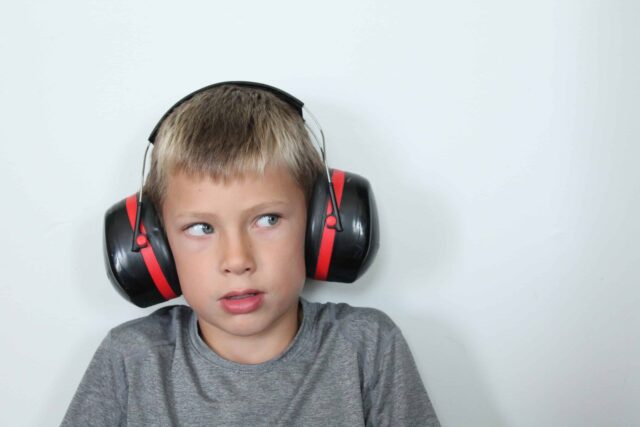
How You Can Help Support Your Child That’s Sensitive to Noise
For really young children, most of this responsibility will fall on you, as the parent. But, as children get older, they can learn to advocate for themselves and have a tool box of tricks to help themselves when they find a noise is bothering them. Before we get to those specific strategies, I want to walk through some specific steps that you can use over and over again when you’re faced with the challenge of a child that’s sensitive to noises.
1. Realize that it’s not their fault – Hopefully after reading why kids are sensitive to noise above, you’re beginning to think about your child’s reactions in a new light. This simple mindset shift allows you to be more emotionally available and think a little more clearly when your child is having a melt down. Your child will sense that you’re there to help them. That you yourself are support. This is a good thing and your bond will deepen because of it.
2. Identify what sounds tend to bother your child – Take a few minutes to think about the noises that bother your child. Are they annoying sounds that repeat in their environment, like the low-buzz of the lights? Or, are they only bothered by the hand dryers in Target? Or, is it both?
Knowing which noises tend to set them off will help you be prepared for these noises whether you can plan for them or not. If you’re not sure, don’t hesitate to ask your child, at a time when their calm. One other thing to keep in mind is that toddlers that aren’t speaking yet or kids that are non-verbal may give other subtle indications that noise is bothering them before they totally melt down. Do you notice rocking, temper increasing, pacing, etc.?
If so, they may be trying to cope with a repetitive noise. Try to tune into your own hearing in a more heightened way. Is there anything that you hear that you didn’t notice before?
3. Is there a way to easily avoid these sounds? – Some sound can be somewhat avoidable. If your child hates loud music, don’t play it. You can also turn off certain appliances or use the vacuum when they can be in another space. Of course, there will be times you can’t avoid the hand dryer or fire truck, so we’ll need the next step.
But, before we move on, it’s important to note that if your child has already hit meltdown mode because of a bothersome sound, stopping the noise probably won’t matter at this point, but it may help you respond quicker the next time they experience the same noise.
4. Teach your child to protect their ears – The absolute simplest thing you can do for any child is to teach them to immediately cover their ears, and press hard into their head to minimize the noise. Not only does this help soften the sound, but it also teaches them to be proactive. Not to mention that the pressure they’re placing on their heads is giving calming proprioceptive input.
You can practice this before they encounter a noise. For instance, you might say to your child before you go to the store, “If you hear a noise you don’t like, you can cover your ears like this.” Or, if a loud sound pops up unexpectedly, quickly and clearly tell them, “Cover your ears.” Put your hands on top of theirs to show them how, if need be.
In addition, you can also have a pair of noise cancelling headphones, or regular headphones playing music or sound they do like available. Have them available wherever they need them…
In your purse or diaper bag.
In the car.
In their book bag.
In your house, where they can easily get to them (maybe place in a special basket or bin?)
5. Find another support to help calm down – This is the step most people overlook, but this is what can help your child recover quickly from a meltdown. Now what helps calm YOUR child down will be unique. You’ll want to think about what they normally like, and what’s maybe worked before. Always respect your child and what they need in the moment, never forcing anything.
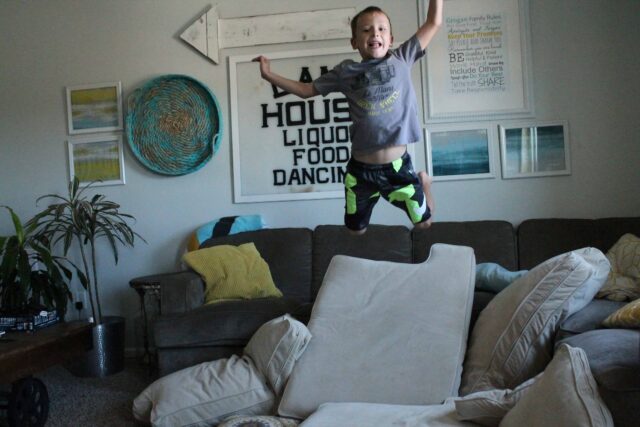
Additional activities that can help your child are:
- Giving them a firm bear hug
- Placing your hands firmly on their shoulders
- Doing joint compressions (not for all kids, this is a sensory trick!)
- Squeezing or holding a stuffed animal or fidget toy
- Holding them and rocking back and forth
- Allowing them to retreat to quiet place or inside of a sensory tent
- Give them the chance to jump on the couch, bed, or trampoline
- Chewing gum or sucking on a piece of candy (See more about oral sensory activities)
Find more ways to help your child calm down in Sensory Diet Activities.
Because an auditory sensitivity can wreck the delicate balance of the whole sensory system, giving input or calming sensations to the other senses can help them relax and recover more quickly. If you aren’t sure what will help, you can try using sensory cards and showing your child pictures so they have a few ideas to choose from.
Just remember to keep what you offer simple and focused on calming. But, your child will ultimately know what’s going to help them the most!
Lastly, if your child is in daycare or school, you’ll want to help educate the teachers and caregivers to the best of your ability. This communication is critical so they can support your child when you can’t. For strategies on how to have a helpful and productive conversation with your child’s teacher, check out Sensory Strategies for School.
Affiliate links used below. See our full disclosure.
Tools to Help Kids Sensitive to Noises
There are so many options available to help kids sensitive to noise, but you’ll want to make an educated decision about which ones will most likely help your child. Some kids like tiny headphones that go inside of their ears because it’s much less tactile input than traditional headphones. Other kids may like the pressure on their head from noise cancelling headphones. Here are some of my top picks as an OT:
- Noise Canceling Headphones for Kids – These are perfect if you just want to block the noise out. They fit easily in a purse or bookbag and are affordable enough to have several pairs in various locations, if needed!
- Headband headphones for kids – If your kiddo wants something soft on their head and ears or is motivated by a cute animal (there’s a bunch to choose from), this could be a great fit.
- Vibes Ear Plugs – So I haven’t actually used these but, they look amazing. A year ago, I watched this video about how they worked and it left an impression on me. These little ear plugs are easy to place in the ear and they only cancel out the loud noises in the environment, but still allow you to hear people talking!
Is Being Sensitive to Noise Just the Tip of the Iceberg?
If your child’s sensory needs or behaviors seem overwhelming, confusing, or out of control know, that you’re not alone. Not all professionals are trained in sensory and in general, there’s a lack of understanding. I want to change that! Join me as I reveal 3 Expert Secrets to Calm + Focus Your Child with Specialized Sensory Activities, a free workshop.
More Sensory Tips and Tools
What is a Sensory Diet: Does My Child Need One?
Sensory Diet Template Printable
Epic Messy Play List that’s Sensory-filled, Inspiring, and Easy!
Alisha Grogan is a licensed occupational therapist and founder of Your Kid’s Table. She has over 14 years experience with expertise in sensory processing and feeding development in babies, toddlers, and children. Alisha also has 3 boys of her own at home. Learn more about her here.
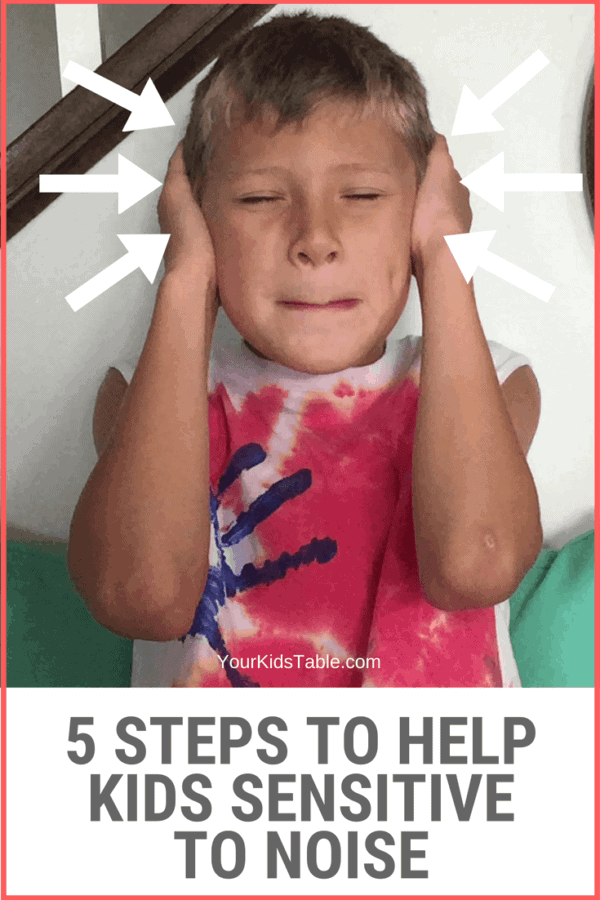
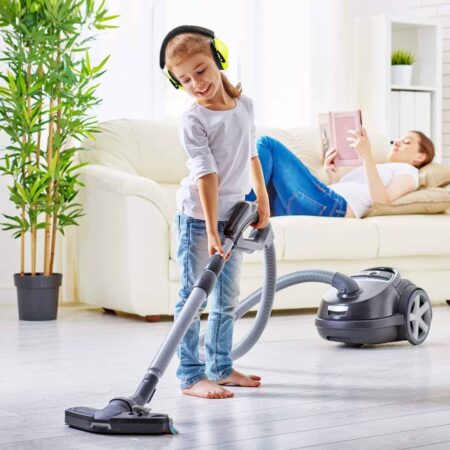
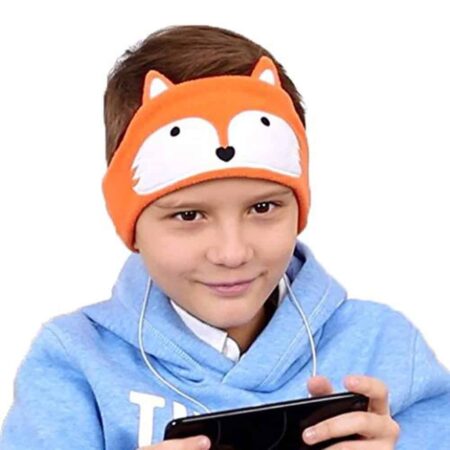
My 13 year old daughter is ASD. The 7th grade has been overwhelming for her. She complains about noise regularly. She has noise zeroing out headphones for when it’s noisy in class. She can also ask for a break and the teacher will let her walk out. But she says it is so painful she doesn’t want to remove her hand from her ears and headphones to ask for a break. She rocks back and forth and frequently cries. This is a constant problem in the classroom before. Do you have any suggestions to help her?
Hi Kaylee! Thanks for reaching out! It’s great that her teacher is aware of this and allows her to walk out if she needs. The noise-cancelling headphones are also great! If theyre not working 100%, maybe try these Vibe headphones, which have great reviews and cancel noise while allowing you to still hear someone talking. Other things that may help would be fidget toys, a stuffed animal, or chewing gum. Perhaps talk with her teacher about these things to see if they can accommodate her. Outside of the classroom, work with her on being able to calm herself down by using breathing exercises or sensory activities to help.
Best,
Kalyn
My 11 year old son is ASD. 6th grade has been overwhelming for him. He has never had complaints about noise so regularly. He has noise zeroing out headphones for when it’s noisy in class. He can also ask for a break and the teacher will let him walk out. But he says it is so painful he doesn’t want to remove his hand from his ears and headphones to ask for a break. He rocks back and forth and sometimes crys. This was never a problem in classroom before. Do you have any suggestions to help him?
Hey Andrea,
That sounds really challenging for your son! What a hard thing to deal with while he’s also adjusting to middle school. It’s great that his teachers are willing to let him have a break. He may also be dealing with the overwhelm of starting middle school, so the noise is really getting to him more. Is there something, like a fidget or comfort item that you use at home or when he’s out to help him calm down? It might be worth trying that at school as well. Another thought might be to explain that he’s not asking for breaks because he doesn’t want to uncover his ears. Maybe they could come up with another way to communicate where he doesn’t have to raise his hand. We also have a few suggestions in THIS article for dealing with noises.
Best,
Andrea
Hi, my 8 year old has been complaining whenever there is low volume such as the tv or radio in the car. He gets very mad and upset and whenever he is sick he starts to hate basically anything That’s a Sound. he had started this issue most likely when I was driving on the highway when the window got opened. it was stormy and from then, he started to say “aaooowww”. (he was about 4-5), and even hits sometimes. When he is using what he likes such as computer games, he doesn’t complain as much. sometimes, whenever my other son says something like “dabio” a character from a tv show he complains not to say it. but in the actual show, whenever they say “dabio” he doesn’t complain because of “accent” and hates when someone cover their noses or says something while covering nose. Plus, when he is confronted by a word that has no n, nor m like “talk about” he dislikes it a lot even though when he forgets it, he says it. is there anything I should do? Does he do this on purpose?
Hi Aneeb! Thanks for reaching out! It definitely sounds like he has some sensory sensitivities related to noise and auditory processing. Try using some noise-cancelling headphones or ear plugs to help with certain situations! For more help, check out our free sensory workshop, which goes over more in-depth information and tips for sensory sensitivities. Save your seat here!
Best,
Kalyn
I have a 3 and half year old.
He hates noise even visiting family if there are a few conversations going on in one room he can’t cope and hold his ears shouting I don’t like the noise or he will just do an outburst scream.
He can’t cope if he’s in the room with washing machine on or kettle. Won’t go near a hand dryer and avoids the garden if someone is cutting grass.
Unsure on what I should do as he’s starting school soon and think he’s going to struggle with the noise of lots of children x
Hey!
Thanks for reaching out! First, I’d make sure to discuss with his teachers so they are aware and can help him through it. Also, I’d really look at the suggestions in the article particularly numbers 4 and 5, so that you can teach him methods to cope with it! It can be some trial and error but working on it at home first can help him be able to carry it over to school.
Best,
Desiree
My 6yo boy has started falling behind in Year One. He has just told me that he can’t focus because the class room is just too noisy. He has always hated big crowds and noisy sports arenas, but usually asked for a phone/ipad to watch something – never seemed like a big deal as he could clearly focus on the screen in front of him with all of that going on. He is also having trouble recalling his letter sounds now and blends and falling behind. Could these two things be linked? Both appear to be auditory?
Yes, Adrienne It does sound like you’re on the right track! These two things can be related with Auditory. We do have a post on Auditory Processing that may be helpful as well. You can read all about it HERE
Best,
Desiree
Any suggestions for a 3.5 year old just starting full day, everyday Pre-school in his elementary school and having trouble with the large gym class and echoes, fire alarm, school bell or blow dryers? Fireworks and loud concerts/movies have bothered him too. Especially unexpected, he will cover ears or crying if it’s too long of exposure. Yet, Other sounds don’t bother him at all, like running the vacuum, he helps, lawn mower/leaf blower, and he often asks to turn music loud in car for fun….I’m afraid the ear plug use might not allow him to get used to these types of sounds he hasn’t frequently been exposed to or hinder development. And now in school he’s exposed daily to these types of sounds… But the only time he has cried so far in this new school setting was during those specific times of day, at the end of the day, in gym class and waiting for dismissal in cafeteria with all the Pre-schoolers) If worn too often will it become dependent or as a crutch? At home we used to just bring headphones if needed rarely but now I’m wondering if it’s a phase and he needs more exposure to ensure comfort and safety with those sounds or more going on. Should I see a doctor if it doesn’t improve at school. Thoughts? Thanks for any thoughts?
Hi Kris,
So happy that you seem aware as to what is happening with your child. If there are only a few times that he is getting upset I would present him with option of covering ears, etc to decrease that noise while he is in school and he can work on other sounds at home, etc. Check out our free workshop on sensory as it will give you some great insight! Save your seat here.
Best,
Desiree
I have had sensory processing issues since I was born. Unfortunately, I was not diagnosed until I was 58. I just got told to be like everyone else and spanked when I couldn’t comply. By the age of 5 I had learned to use sugar to numb myself, and as a result I am an alcoholic (sober for 28 years) and a compulsive overeater.
Symptoms get worse as I age. There are more symptoms, they are triggered by any kind of stress including pollen season, heat, cold, rain, people, noise, and emotional stress. Breathing in a non-rhythmic way can help. Focusing on painting can help. Exercise helps.
I felt happy when I had a child because I swore I wouldn’t make her wear what didn’t feel good. We bought one pair of socks of several kinds when she was little until we found one brand that worked. Ditto underwear and bras when she was old enough. She likes tight clothes so she wore tight clothes. I am a loose clothing person, including shoes, so I wear loose clothing. I have to have cotton on my body. Sometimes I can tolerate fleece. She can wear anything. Having a parent who understands was a godsend to her.
Thanks so much for sharing! I’m so sorry that nobody knew how to help you then, that’s why I’m so passionate about spreading the word!
Hello
How do the animal head band headphones work for them! Is there a wire hanging down? I have a three year old trying to find soffit her at school
Yes there is a wire hanging down to connect them, they are not wireless headphones
My daughter developed severe sensitivity to noise when she was 6. It took us 3 years- which brought on a progression of new symptoms- to learn that’s she was actually suffering from Lyme Disease. Symptoms in children can include noise, light, and skin sensitivity. During the course of her illness we also saw outbursts, fear, anger, meltdowns, difficulty with memory and concentration, reading comprehension difficulties, visual and auditory hallucinations, and autistic-like behavior in addition to the eventual development of physical symptoms.
In addition to learning to cope with this sensitivity, I would recommend trying to rule out medical causes (especially Lyme) of ear sensitivity, and especially if you see a rather quick onset, but also realize that children can be born with Lyme if the mother has been infected.
Thank you Jessica for sharing your story.
Can you or will you help. I am a preschool teacher, a female almost 4 has separation situations with both parents. Also, does not like to hear others yelling, will cry for mom. Constantly will follow me around the classroom. Any comments are appreciated.
Hi Pam,
We have a new free workshop going on next week that is all about decreasing meltdowns in kids. We have 2 versions- a parent and a therapist one. The therapist version may really help give you some ideas for how to help kids like the one you described. It’s not just for therapists, but lots of teachers as well!
If you’re interested, you can sign up here.
Best,
Laura
Your Kid’s Table OT
Thank you for this article. My 12 yr old special needs daughter is extremely sensitive to loud noise such as buzzers, sirens and especially fireworks. In the summer it has gotten to the point where we cant go outside all summer because we WILL inevitably hear one or two ‘booms’ every. We’ve tried those techniques that you mentioned and we have noise canceling headphones which I just got her to start wearing but we still cannot go outside I was wondering if you had any other tips that might help thank you
That’s so hard! I’d make sure her noise cancelling headphones are on. I’d also consider the last step I listed above… is there anything else that could calm her down. Does she like fidgets, squeezing a stuffed animal, etc. This additional tool could help make her feel more secure. I’d also start with very small intervals- getting outside for a few seconds, then a few minutes, and so on.
That sounds like a great idea! We will give these techniques a try. Thank you for the quick response and for taking the time to put these articles together and send to our group! I can’t image how time consuming all this must be for you but know that it is so very much appreciated. Thank you
* The following comment was inadvertently deleted due to a technical error.
From Carol:
Wow! Thanks for this timely information especially with a new school year right around the corner! I had a student last year where the fire drill was an issue. It took all year almost for him to adapt. Some of the things I did was : first I acknowledged the fear; fave clear expectations of the safety procedure imitated the expected sound ; had him be my line leader so I could hold his hand ; told him it was his job to take the class to our safety spot once we cleared the door. Perhaps these ideas will help another teacher. Thanks for All your posts. Hope your kids have an awesome school year!!